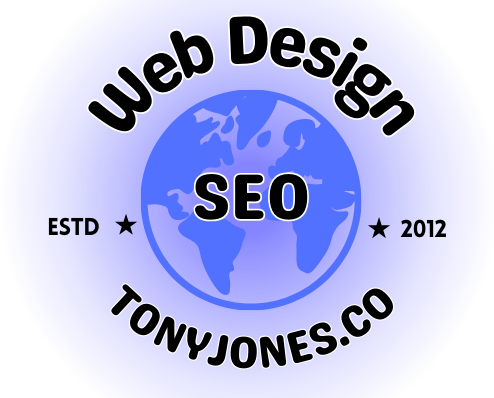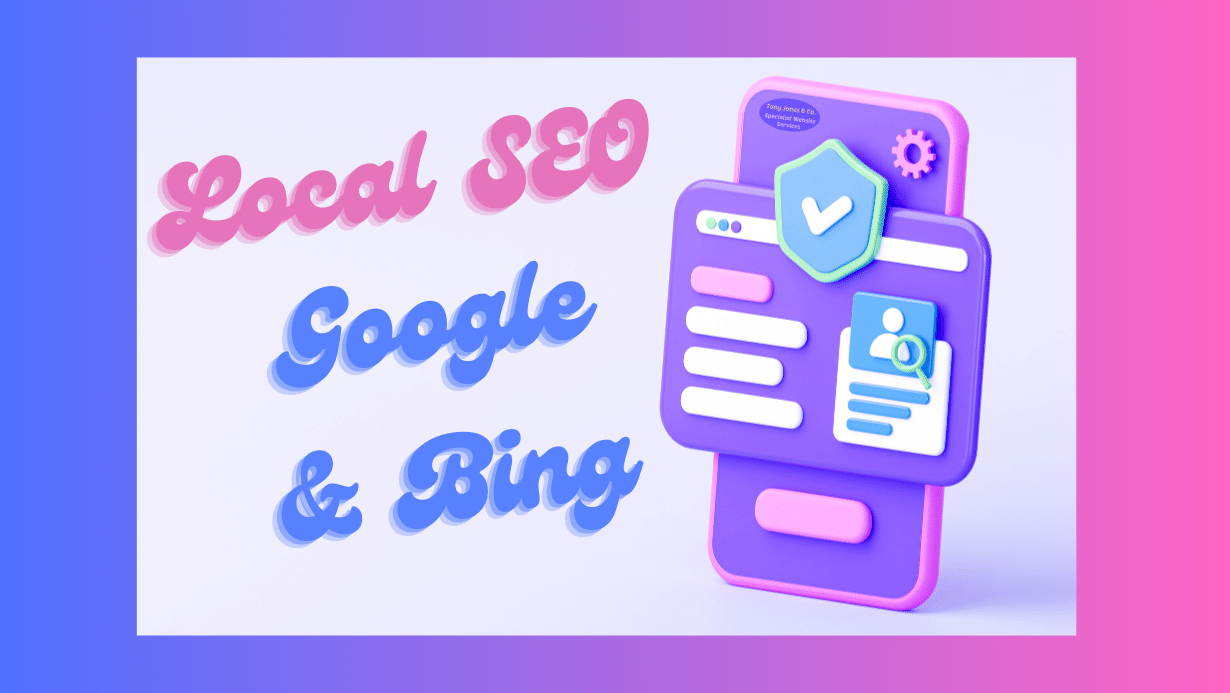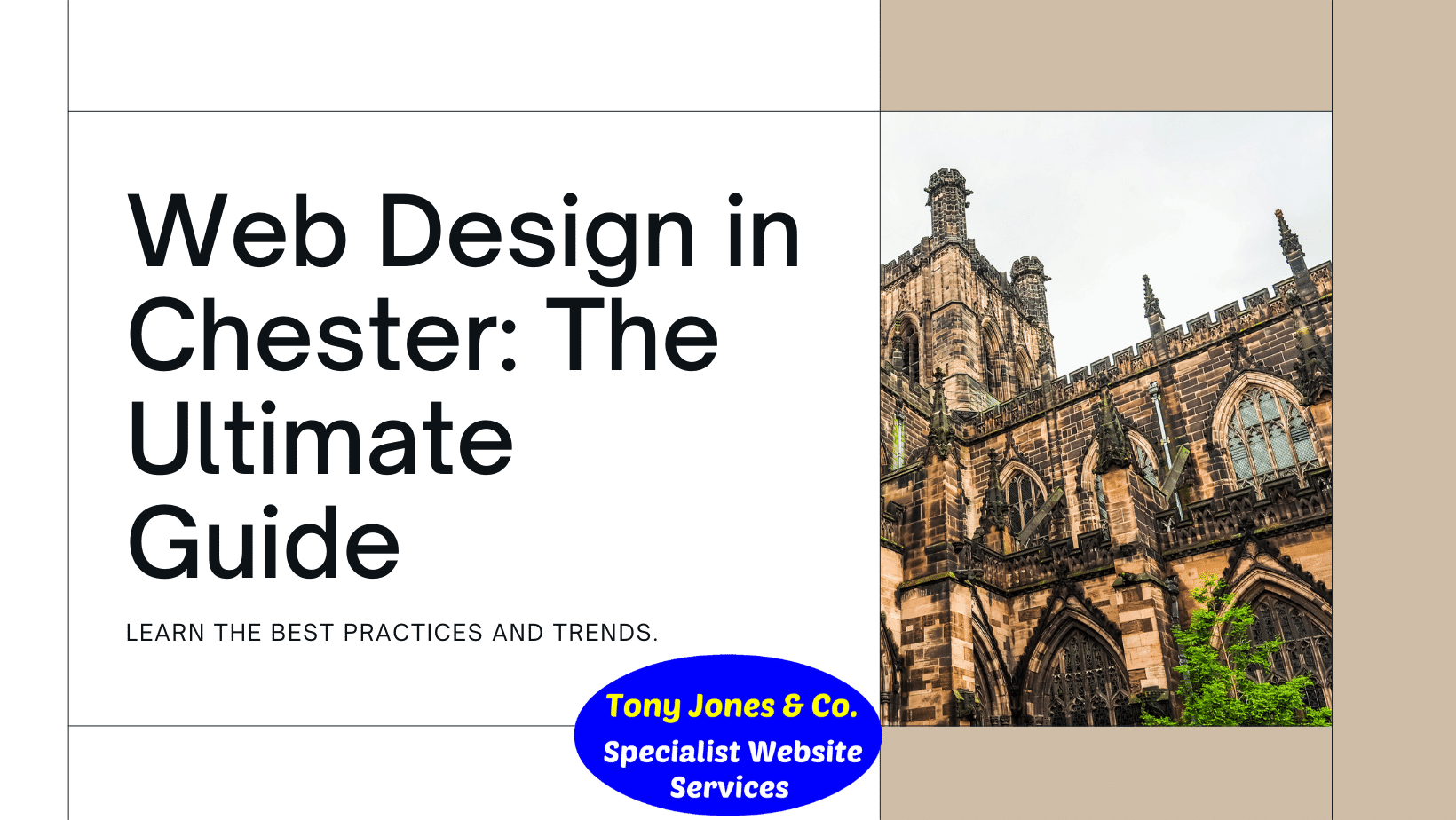Web Designer Wrexham, Professional Website Services - Tony Jones CITP, FBCS.
The Winning Formula: Organic SEO Strategies for Top Google Ranking
Master the winning formula for top Google ranking with organic SEO strategies. Boost your online visibility and dominate the search results!

The Importance of Organic SEO
To achieve a top ranking on Google, understanding and implementing effective organic SEO strategies is essential. Organic SEO refers to the process of optimizing a website to improve its visibility in search engine results pages (SERPs) without relying on paid methods. By focusing on organic SEO, businesses can attract more organic traffic and gain higher visibility among their target audience.
Understanding Organic SEO
Organic SEO involves a range of techniques and best practices aimed at improving a website's search engine visibility. It focuses on optimizing various aspects of a website, including its content, structure, and technical elements, to ensure that search engines can easily crawl, index, and understand the site's relevance to specific search queries.
By optimizing a website organically, businesses can increase their chances of appearing on the coveted first page of Google search results. This is important because the majority of users tend to click on the top-ranking results, with the first page accounting for the majority of organic traffic. Implementing effective organic SEO strategies helps businesses compete for these valuable positions and attract highly targeted organic traffic.
Benefits of Organic SEO
Optimizing a website using organic SEO techniques offers numerous benefits, including:
- Cost-effectiveness: Organic SEO strategies do not require businesses to pay for ad placements or clicks. By focusing on organic methods, businesses can achieve sustainable long-term growth without relying solely on paid advertising.
- Improved visibility: Ranking higher on Google search results increases a website's visibility and exposure to a larger audience. This can lead to increased brand awareness and more potential customers discovering the business.
- Higher credibility: Organic search results are perceived as more trustworthy and credible by users. Achieving a top ranking through organic SEO can enhance a business's reputation and build trust with its target audience.
- Long-term results: Unlike paid advertising, which stops generating traffic as soon as the budget is depleted, organic SEO strategies provide long-term benefits. Once a website establishes a strong organic presence, it can continue to attract organic traffic and generate leads without ongoing ad spend.
By understanding the importance of organic SEO and its benefits, businesses can develop a strong foundation for their online presence. This includes conducting comprehensive keyword research and implementing on-page optimization, off-page optimization, technical SEO, and monitoring and analytics practices. To stay up-to-date with the latest industry trends and techniques, it is essential to follow relevant blogs and news sources, attend webinars and conferences, and network with SEO professionals.
For more information on improving your Google search ranking, check out our article on improving Google search ranking.
Keyword Research and Analysis
A crucial step in organic SEO is conducting thorough keyword research and analysis. This process helps identify the target keywords that will drive relevant traffic to your website and improve your chances of securing a top Google ranking. Let's explore how to identify target keywords and the tools that can assist in the keyword research process.
Identifying Target Keywords
To start, it's important to understand your target audience and the search terms they are likely to use when looking for products or services related to your business. Put yourself in their shoes and consider what they might type into a search engine. These are the keywords you want to focus on.
It's essential to strike a balance between high search volume keywords and those with less competition. Highly competitive keywords may be challenging to rank for initially, so it can be beneficial to target long-tail keywords - longer, more specific phrases that have lower search volume but are highly relevant to your business. This approach allows you to capture a more targeted audience.
Consider using keyword research tools to help identify relevant keywords and their search volume. These tools provide valuable insights into the popularity and competitiveness of specific keywords. Some popular keyword research tools include:
Keyword Research Tool Features Google Keyword Planner Provides keyword ideas, search volume, and competition data.SEMrush Offers comprehensive keyword research and analysis, competitor analysis, and more.Ahrefs Provides keyword analysis, search volume data, and competitor research.Moz Keyword Explorer Offers keyword suggestions, search volume, and difficulty score.
By utilizing these tools, you can identify target keywords that align with your business objectives and have the potential to drive organic traffic to your website.
Tools for Keyword Research
In addition to keyword research tools, there are other valuable resources that can aid in your keyword research and analysis. These resources provide insights into search trends, related keywords, and search volume data. Some useful tools and platforms to consider include:
- Google Trends: This tool allows you to explore search trends over time and compare the popularity of different keywords or topics.
- Google Search Console: By analyzing the search queries that are driving traffic to your website, you can uncover additional keyword opportunities.
- Keyword.io: This platform provides keyword suggestions based on search queries from various sources, including Google, Bing, and Amazon.
By leveraging these tools and platforms, you can refine your keyword research and gain a deeper understanding of the search landscape related to your business.
Keyword research and analysis lay the foundation for effective organic SEO strategies. By identifying target keywords and utilizing appropriate tools, you can optimize your website and content to improve your chances of achieving a top Google ranking. Stay tuned for the upcoming sections, where we'll explore various on-page and off-page optimization techniques to further enhance your SEO efforts.
On-Page Optimization
To achieve a top ranking on Google, on-page optimization plays a crucial role. This involves optimizing various elements on your website to make it more search engine-friendly and improve its visibility. In this section, we will explore key on-page optimization techniques that can help boost your organic SEO efforts.
Optimizing Page Titles and Meta Descriptions
Page titles and meta descriptions are essential components of on-page optimization. They provide a concise summary of the page's content and help search engines understand what the page is about. It's important to include relevant keywords in both the page title and meta description to improve its visibility in search engine results.
When crafting page titles, keep them concise and descriptive, ensuring they accurately reflect the content on the page. Meta descriptions should be well-written, informative, and compelling, encouraging users to click through to your website. Remember to incorporate relevant keywords naturally without keyword stuffing. For more information on improving your Google search ranking, check out our article on improving google search ranking.
Creating High-Quality and Relevant Content
Creating high-quality and relevant content is crucial for on-page optimization. Search engines prioritize websites that provide valuable and informative content to users. Develop content that aligns with your target audience's interests and needs, and make sure it is well-researched, well-written, and engaging.
To optimize your content for search engines, ensure it includes relevant keywords naturally. Avoid overusing keywords, as this can negatively impact the readability and user experience. Additionally, incorporate headings and subheadings to structure your content properly and make it easier for search engines to understand. For more tips on how to get on page one of Google, check out our article on how to get on page one of Google.
Optimizing Headings and Subheadings
Headings and subheadings not only improve the readability of your content but also play a crucial role in on-page optimization. These elements provide structure and hierarchy to your content, making it easier for both users and search engines to navigate and understand.
Ensure that you use descriptive and keyword-rich headings to accurately represent the content under each section. By incorporating relevant keywords naturally in your headings and subheadings, you can improve the visibility of your website in search engine results. For more tips on optimizing your website for top Google ranking, check out our article on google page one ranking strategy.
Incorporating Keywords Naturally
Keyword integration is an important aspect of on-page optimization. Incorporating relevant keywords naturally throughout your content can help search engines understand the relevance of your page to specific search queries. However, it's crucial to avoid keyword stuffing, as this can have a negative impact on your website's ranking.
Focus on using keywords strategically in your content, including in the page title, headings, subheadings, and body text. Use synonyms and variations of your target keywords to make your content more diverse and natural-sounding. For more in-depth tips on optimizing your website for higher Google ranking, check out our article on seo techniques for higher google ranking.
Optimizing Images and Multimedia
Optimizing images and multimedia elements on your website is an often overlooked but essential aspect of on-page optimization. Search engines cannot directly interpret images, so it's important to optimize them using descriptive file names and alt tags that include relevant keywords.
Compressing images to reduce their file size is also important for improving website speed and performance. A faster website not only enhances user experience but also contributes to better search engine rankings. For more tips on optimizing your website's performance, check out our article on website speed and performance optimization.
By implementing these on-page optimization techniques, you can improve your website's visibility and increase its chances of achieving a top Google ranking. Remember, on-page optimization is just one component of a comprehensive organic SEO strategy. To maximize your results, it's important to combine on-page optimization with off-page optimization, technical SEO, and continuous monitoring and analysis of your website's performance.
Off-Page Optimization
When it comes to organic SEO and achieving a top Google ranking, off-page optimization plays a crucial role. Off-page optimization involves strategies that are implemented outside of your website to improve its visibility and authority. In this section, we will explore three key tactics for off-page optimization: building high-quality backlinks, leveraging social media, and guest blogging and influencer outreach.
Building High-Quality Backlinks
Backlinks are links from other websites that point to your website. They are an important factor in determining your website's authority and credibility in the eyes of search engines like Google. Building high-quality backlinks from reputable and relevant websites can significantly improve your organic rankings.
To build backlinks, start by creating valuable and engaging content that other websites would be interested in linking to. This could be in the form of informative blog posts, research papers, or industry guides. Additionally, reach out to relevant websites, bloggers, and influencers in your niche and request them to link to your content. Remember, the key is to focus on quality rather than quantity when it comes to backlinks.
Leveraging Social Media
Social media platforms provide an excellent opportunity to increase your website's visibility and attract more organic traffic. By leveraging social media effectively, you can engage with your target audience, promote your content, and encourage social sharing.
Create social media profiles for your business on platforms that are popular among your target audience. Regularly share your blog posts, articles, and other valuable content on social media to drive traffic back to your website. Encourage your followers to engage with your content by liking, sharing, and commenting. This helps to increase your content's reach and potentially attract more backlinks.
Guest Blogging and Influencer Outreach
Guest blogging and influencer outreach are effective off-page optimization techniques that can help expand your reach and build your website's authority. By collaborating with industry influencers and contributing guest articles to reputable websites, you can tap into their existing audience and gain exposure to a wider range of potential visitors.
Identify influential bloggers, experts, or websites in your niche and reach out to them. Propose valuable content ideas that align with their audience's interests and offer to contribute as a guest author. This not only helps you gain exposure but also allows you to include a link back to your website in the author bio or within the content itself, providing a valuable backlink.
By implementing these off-page optimization strategies, you can enhance your website's visibility, authority, and ultimately improve your chances of ranking highly on Google. Remember to regularly monitor and analyze your off-page efforts to assess their effectiveness and make necessary adjustments. For more tips on improving your website's search ranking, check out our article on improving Google search ranking.
Technical SEO
To achieve a top Google ranking, it's essential to focus on technical SEO. This aspect of SEO involves optimizing your website's technical elements to enhance its visibility and user experience. The following key areas play a crucial role in technical SEO:
Improving Website Speed and Performance
Website speed and performance are critical factors that affect user experience and search engine rankings. Slow-loading websites can lead to higher bounce rates and lower user engagement. To improve website speed and performance, consider the following strategies:
- Optimize images: Compress images without compromising quality to reduce file size and improve loading times.
- Minify code: Minify HTML, CSS, and JavaScript files by removing unnecessary characters, spaces, and comments.
- Enable caching: Implement browser caching to store certain elements of your website locally, reducing load times for returning visitors.
- Use a content delivery network (CDN): Utilize a CDN to store and deliver website content from servers closer to the user, improving loading times across different geographical locations.
Regularly monitoring and optimizing website speed and performance is crucial for maintaining a high-ranking position on Google. For more detailed information, check out our article on improving Google search ranking.
Optimizing Mobile Responsiveness
With the increasing use of mobile devices, Google prioritizes mobile-friendly websites in its search results. Optimizing your website for mobile responsiveness is imperative for both user experience and SEO. Consider the following best practices:
- Implement responsive design: Use responsive design techniques to ensure that your website adapts to different screen sizes and devices.
- Mobile-friendly navigation: Optimize your website's navigation for mobile devices, ensuring ease of use and intuitive browsing.
- Avoid intrusive interstitials: Ensure that pop-ups or interstitials do not obstruct the main content on mobile devices.
By providing a seamless mobile experience, you can improve user engagement and increase your chances of ranking higher on Google's search results. For more tips, refer to our article on how to get on page one of Google.
Implementing Structured Data Markup
Structured data markup helps search engines understand the content on your website more effectively. By implementing structured data, you can provide additional context to search engines about your webpages, which can enhance your visibility in search results. Consider the following methods of implementing structured data markup:
- Schema.org: Utilize the Schema.org vocabulary to markup important elements on your website, such as product information, reviews, events, and more.
- JSON-LD: Implement JSON-LD (JavaScript Object Notation for Linked Data) to add structured data markup to your website's HTML code in a way that is easily readable by search engines.
- Rich snippets: Use structured data to create rich snippets, which can enhance how your website is displayed in search results, including additional information such as star ratings, reviews, and more.
By incorporating structured data markup, you can provide search engines with valuable information about your website, resulting in improved visibility and click-through rates. For more guidance, visit our article on Google page one ranking strategy.
Ensuring Proper Website Indexing
Proper website indexing is crucial for search engines to discover and understand your website's content. To ensure that your website is effectively indexed, consider the following strategies:
- Create a sitemap: Generate a sitemap.xml file that includes all the important pages on your website, allowing search engines to easily crawl and index your content.
- Check for crawl errors: Regularly monitor your website for crawl errors using tools like Google Search Console. Fix any issues that may prevent search engines from properly accessing your webpages.
- Robots.txt file: Use a robots.txt file to instruct search engine crawlers on which pages of your website to crawl and which ones to exclude.
By ensuring proper website indexing, you can increase the chances of your web-pages being ranked and displayed in search results. To learn more about SEO techniques, visit our article on SEO techniques for higher Google ranking.
Technical SEO plays a critical role in achieving a top Google ranking. By focusing on improving website speed and performance, optimizing mobile responsiveness, implementing structured data markup, and ensuring proper website indexing, you can enhance your website's visibility and user experience, ultimately leading to higher rankings in search engine results pages.
Monitoring and Analytics
To ensure the success of your organic SEO strategies and maintain a top Google ranking, it is crucial to monitor and analyze various aspects of your website's performance. This section will focus on three key areas: tracking keyword rankings, monitoring website traffic, and analyzing user behavior and engagement.
Tracking Keyword Rankings
Tracking the rankings of your target keywords is essential to assess the effectiveness of your organic SEO efforts. By monitoring keyword rankings, you can determine which keywords are performing well and identify areas for improvement. There are several tools available that can help you track keyword rankings over time, providing valuable insights into the success of your SEO campaign. For more information on improving your Google search ranking, refer to our article on improving Google search ranking.
Monitoring Website Traffic
Monitoring website traffic allows you to understand the volume and sources of traffic coming to your site. By analyzing this data, you can gain insights into which pages are performing well and which may require optimization. Tracking website traffic can also help you identify trends, such as seasonal fluctuations or changes in user behavior. Tools like Google Analytics provide comprehensive data on website traffic, including the number of visitors, page views, and bounce rates. For more information on how to get on page one of Google, check out our article on how to get on page one of Google.
Analyzing User Behavior and Engagement
Understanding how users interact with your website is crucial for improving its performance and user experience. Analyzing user behavior and engagement metrics provides insights into the effectiveness of your content and design. Key metrics to consider include average time spent on site, bounce rate, and conversion rates. By examining these metrics, you can identify areas where users may be experiencing issues or where your content may need improvement. For more tips and techniques on optimizing your website for higher Google ranking, visit our article on SEO techniques for higher Google ranking.
Regularly monitoring and analyzing these aspects of your website's performance will enable you to make data-driven decisions and continuously improve your organic SEO strategies. By optimizing your website based on the insights gained from keyword rankings, website traffic, and user behavior, you can increase your chances of achieving and maintaining a top Google ranking. Remember to stay up-to-date with the latest SEO trends and techniques by following industry blogs, attending webinars, and networking with SEO professionals.
Staying Up-to-Date with SEO Trends
In the ever-evolving world of SEO, staying informed about the latest trends and updates is essential to maintain a competitive edge. By keeping up-to-date with the industry's best practices and strategies, you can ensure that your website continues to rank highly in search engine results. Here are three key ways to stay informed:
Following Industry Blogs and News
One of the most effective ways to stay updated on SEO trends is by following reputable industry blogs and news sources. These platforms provide valuable insights, analysis, and updates on the latest SEO strategies and algorithm changes. By regularly reading blog posts and articles from trusted sources, you can stay informed about emerging trends and best practices.
Some popular SEO blogs to follow include:
- Improving Google Search Ranking
- How to Get on Page One of Google
- Google Page One Ranking Strategy
- SEO Tips for Top Google Ranking
- SEO Techniques for Higher Google Ranking
By regularly reading these blogs and staying informed about the latest SEO trends, you can adapt your strategies accordingly and ensure that your website remains optimized for top Google rankings.
Attending Webinars and Conferences
Webinars and conferences offer excellent opportunities to learn from industry experts and stay up-to-date with the latest SEO trends. These events provide insights, case studies, and practical tips from professionals who are at the forefront of the SEO industry. Attending webinars and conferences allows you to expand your knowledge, gain valuable insights, and network with like-minded professionals.
Keep an eye out for webinars and conferences hosted by reputable SEO organizations and industry leaders. These events often cover a wide range of topics, including algorithm updates, content optimization, link building strategies, and more. By participating in these events, you can gain valuable insights and stay ahead of the curve in the ever-changing world of SEO.
Networking with SEO Professionals
Networking with other SEO professionals is an effective way to stay informed about the latest trends and strategies. Engaging in discussions and sharing insights with peers in the industry can provide valuable perspectives and help you stay updated on the latest SEO developments. Networking can take place through online forums, social media groups, or professional networking events.
By building connections with SEO professionals, you can exchange knowledge, discuss challenges, and gain insights into successful strategies. These interactions can help you refine your SEO techniques and stay ahead of the competition.
Remember, the world of SEO is constantly evolving, and staying up-to-date with the latest trends is crucial to maintaining a competitive edge. By following industry blogs and news, attending webinars and conferences, and networking with SEO professionals, you can ensure that your SEO strategies align with the best practices and continue to drive top Google rankings.
Share on:
Questions or further information; please call Tony 07990 797302
About the author Tony Jones CITP FBCS:
An experienced and qualified Web Designer based in Wrexham, a Chartered IT Professional and a Fellow of the British Computer Society.
Contact us
More news and articles: - Websites, Design, SEO, Artificial Intelligence, anything Digital Technology.











